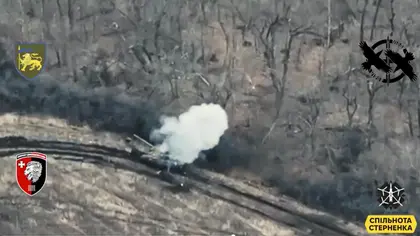The Armed Forces of Ukraine (AFU) have been reportedly testing new first-person view (FPV) drones with automatic targeting that could bypass Russian electronic warfare (EW) jamming, but Moscow has been reportedly testing similar technologies.
According to Serhii Sternenko, a Ukrainian lawyer and activist, the technology was developed jointly by Ukraine’s 60th and 63rd mechanized brigades, where the drone was able to continue flying to its designated target even when faced with “active suppression by electronic warfare systems.”
JOIN US ON TELEGRAM
Follow our coverage of the war on the @Kyivpost_official.
In a social media post, Sternenko attached a video that reportedly demonstrated the drone in action. The video shows the drone supposedly hitting its target successfully despite experiencing communication blackouts.
Normally, FPV drones require the operator to control the drone’s movement directly until it has delivered its hit. This means that EW systems can repel the attack by suppressing the communication between the drone and its operator, denying the operators control over their drones; autonomous targeting is supposed to bypass that necessity.
However, it is not known how the drones were able to achieve that, be it by using artificial intelligence (AI) on board to identify the targets visually or through internal navigation that negates the need for remote control, as used by the Shahed kamikaze drones used by Moscow.
Sternenko said the technology is new and needs scaling to be deployed effectively on the battlefield. He said the goal is to raise Hr.50 million ($1.28 million) to “purchase 1,300+ such drones and invest in the technology itself,” and they will involve the state in procurement once the product and technology matures.

Russia Deploys Thermobaric UAVs – Capable of Inflicting Horrendous Injury
However, Sternenko also said Moscow has been developing similar technologies.
“The Russians have been testing a similar technology for more than a month, so we should invest all the more in development,” he said.
In January, the Director of the Aerial Reconnaissance Support Centre, Mariia Berlinska, expressed similar concerns, as reported by Dev.ua.
“Now Russian engineers are on the verge of a certain technological breakthrough. We are already observing cases when automatic tracking is used in FPV drones next to thermal imaging cameras,” Berlinska said, adding that successful mass production of such technologies by Moscow could represent a major challenge for Ukraine.
You can also highlight the text and press Ctrl + Enter






